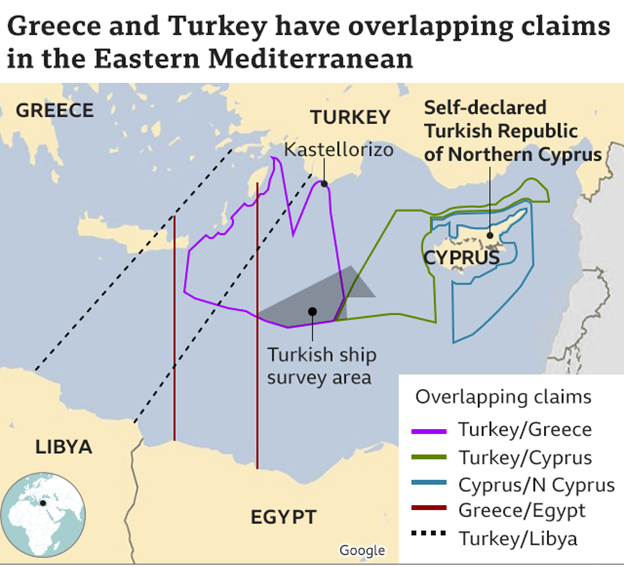Turkey- Russia Military Drill in Eastern Mediterranean | 04 Sep 2020
Why in News
Turkey has announced that Russia will hold live-fire naval exercises in the eastern Mediterranean. This will happen during escalating tensions between Turkey and its coastal neighbors Greece and Cyprus over the rights to search for energy resources in the region.
Key Points
- Complex Geo-politics: Turkey is a North Atlantic Treaty Organization (NATO) member, and it is strange to expect NATO-member Turkey to engage such drills on Russia’s behalf.
- It can be noted that the two countries have in recent years significantly strengthened their military, political and economic ties.
- Russia-Turkey Link:
- Apart from the announced drill, they are coordinating closely on their military presence in Syria.
- Turkey has purchased Russia’s advanced S-400 missiles and has agreed to go with a Russian-built nuclear power plant on its southern coast.
- Reasons:
- Recently, the U.S. lifted a decades-old arms embargo (1987) on Cyprus which created the fresh strains between Turkey and Greece.
- Turkey condemned the move and urged the USA to reverse course to safeguard Turkish-speaking Cypriots.
- The Embargo: To prevent an arms race that would hinder UN-facilitated reunification efforts for Cyprus.
- It was directed against the southern, Greek Cypriot part of the island, where Cyprus' internationally recognised government is seated.
- The Embargo: To prevent an arms race that would hinder UN-facilitated reunification efforts for Cyprus.
- Impact of Russia-Turkey Military Drill:
- Turkey's announcement comes at a time when Turkish survey vessels and drillships continue to prospect for hydrocarbons in waters where Greece and Cyprus claim exclusive economic rights.
- Russia maintains a sizeable naval presence in the eastern Mediterranean and regularly conducts naval manoeuvres.
- It’s also at odds with the European Union over its territorial disputes with bloc members Greece and Cyprus.
- France recently increased its military presence in the area to support Greece and Cyprus.
- Impact on India:
- Energy: Mediterranean oil accounted for about 4.5% of India's overall imports in the year 2019-20. Stability of this region is important for India’s energy security.
- Diaspora: Any turmoil in the region will have an impact on India’s diaspora in the region.
- India is not only a party, but also founded the Non Aligned Movement whereas Turkey and Russia lean to different polar ideologies.
- It is a real test of Indian diplomatic skills to create a balance between different ideologies.
- The diplomatic exchanges between Turkey and India have intensified in recent past following India’s decision to end the special status of Kashmir.
- India’s voice over this remains important being a protagonist of democracy, right to self-determination and sovereign responsibility.
Background of Conflict
- Energy is one of the key factors in the contemporary geopolitics of the Mediterranean region.
- Turkish energy exploration in the eastern Mediterranean has stoked tensions that is rooted in:
- Conflicting interpretations of maritime boundaries.
- The feud between Turkey and Cyprus over gas reserves around the island, whose northern third is controlled by Turkish forces.
- Turkish forces captured the northern third of Cyprus in 1974, following a coup attempt in which a military junta in Athens sought to unite Cyprus with Greece.
- The Republic of Cyprus officially has sovereignty over the entire island, though it in effect remains divided.
- It builds upon a much longer history of enmity between the Greeks and the Turks going back to before the modern Turkish state was founded.
Way Forward
- Conflicting claims over resources because of unresolved border disputes can potentially create a new tension-hotbed in the Mediterranean region. Multiple challenges like pandemic, slow economy have already posed a significant challenge for global leaders and therefore it is very important to address the concerns of stakeholders involved in the region to ensure collective peace and prosperity for all.

